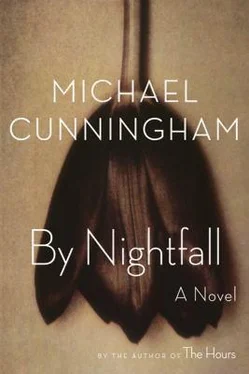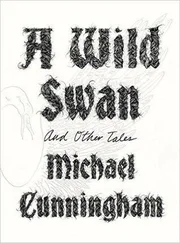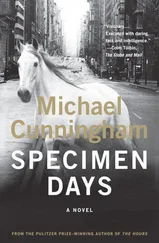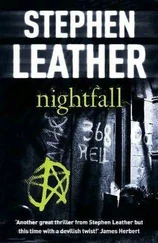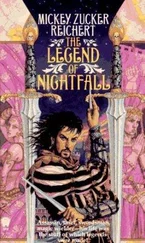1 ...6 7 8 10 11 12 ...51 Peter reaches over and takes her hand. It’s more or less involuntary, and only after he’s touched her does he pause to wonder, is this ridiculous, is it melodramatic? Will she rebuke him? Her fingers are surprisingly soft and crepey, an old woman’s. She squeezes his hand with hers, gently and quickly. They hold hands for a few seconds, then part. If the gesture was excessive or false, if it was self-dramatizing on Peter’s part, Bette doesn’t seem to mind, not now, not in front of the shark.
Peter lets himself into the loft. Quarter past four. He goes to the kitchen counter, puts down the drugstore bag that contains the Excedrin and dental floss he’s picked up (why is it so impossible to go out in New York without buying something?), slips off his jacket, hangs it up. As his ears adjust to the particular sing-silence of home, he hears the shower. Rebecca’s here. Good. He’s often as grateful as Rebecca is for a little solitude when he comes home but not now, not today. It’s hard to say what he feels. He wishes it were as simple as sorrow for Bette. It’s hollower than sorrow. It’s a deep loneliness muddled up with some underlayer of jittery fear, who knows what to call it, but he wants to see his wife, he wants to curl up with her, maybe watch something stupid on TV, let the world go dark for the night, let it fall.
Peter walks through the bedroom to the bathroom. There she is, the pink blur of her behind the frosted glass shower door. There’s mortality in the air and sharks in the water but there’s this, too, Rebecca taking a shower, the vanity mirror fogged by steam, the bathroom smelling of soap and that other undersmell Peter can only call clean .
He opens the shower door.
Rebecca is young again. She stands in the stall facing away from Peter, her hair short, her back strong and straight from swimming; she is half hidden by steam and for an instant it all makes impossible sense: Bette’s hand in Peter’s and the Rodin boy-man waiting for the centuries to bury him and Rebecca in the shower sluicing away the last twenty years, a girl again.
She turns, surprised.
It isn’t Rebecca. It’s Mizzy. It’s the Mistake.
Right. The solid square plates of his pectorals, the V of his hips; here is the small dark bristle of pubic hair, the pink-brown jut of his dick.
“Hey,” he says cordially to Peter. Being seen naked by Peter does not, apparently, render Mizzy even remotely uncomfortable.
“Hey,” Peter answers. “Sorry.”
He steps back, closes the shower door. Mizzy has always been shameless, no, more like shame-free , satyrlike, so unembarrassed by nakedness or by biological functions that he makes almost everyone else seem like a Victorian aunt. With the shower door closed Peter can see only the fleshly pink silhouette, and although Peter knows it’s Mizzy (Ethan) he finds himself pausing, thinking of the young Rebecca (striding into the surf, slipping out of a white cotton dress, standing on the balcony of that cheap hotel in Zurich), until he realizes he’s lingered there a second or two longer than he should—Mizzy, don’t get the wrong idea—and he turns to leave. As he does he catches sight of his own ghostly image, the blur of him, skating across the steam-fogged mirror.
Rebecca’s family is, in its way, a country unto itself. Peter married into it as he might have married the customs and legends, the peculiar history, of a girl from a small, remote nation. The Taylor family nation would be solvent but not wealthy, devoted to regional dishes and handicrafts, lax about timetables and train schedules, tucked into the declivities of a mountain range daunting enough to have protected it from invaders, immigrants, and most ideas and inventions it did not itself engender. Mizzy would be its wounded patron saint, whose pale, glass-eyed effigy is paraded annually through the streets and into the central square.
Before Mizzy, though… There was, still is, the big old dormered house beginning to go terminally soggy under the accumulated heat and soak of eighty-plus Richmond summers. There is Cyrus (professor of linguistics, a small, quietly confident man with a head like Cicero’s) and Beverly (pediatrician, brisk and ironic, defiantly indifferent to housekeeping). And there were, are, three lovely daughters: Rosemary, Julianne, and Rebecca, five years apart. Rose was the beauty, solemn, not unfriendly but not available, either; the girl for whom some older boy with a car was always waiting. Julie was less stunning but more easily amused, a one-of-the-guys girl, loud and funny, a champion gymnast, unapologetically sexual. And then there was Rebecca, born famous thanks to her two older sisters; Rebecca, who was small and pale, gamine, the least beautiful but most intelligent; who had the same aloof, guitar-playing boyfriend since the eighth grade; whose girlhood is epitomized (for Peter) by the yearbook photo in which she, wearing the homecoming crown and holding homecoming roses, stands laughing (who knows why, maybe at the absurdity of where she finds herself) in a little sparkly dress, flanked by the two runners-up, the princesses, who smile mightily for the camera, and who are slightly stolid in their beauty, unremarkable, descendants of those sturdy “marriageable” girls in whom Jane Austen was not particularly interested.
And then. When Rebecca was about to graduate from high school, when Julie was in her second year at Barnard and Rose was already thinking of divorce, the Mistake arrived.
Beverly had had her tubes tied years before. She was forty-five; Cyrus was past fifty. Beverly said, “He must have been desperate to be born.” This statement was taken seriously. She was an expert on children, a doctor of children, and not prone to romances about them.
Peter had met Mizzy when Rebecca brought him for the first time to Richmond. He was nervous about meeting her family, embarrassed over the putative note of impropriety—wasn’t it a little creepy for a graduate student to date an undergraduate from his seminar, even if he had waited until after the semester’s end? Rebecca’s father was a professor, could Peter really and truly believe Rebecca when she assured him that her father didn’t disapprove?
“Just shut up ,” she told him as the plane descended. “Stop worrying. Right now.”
She had that intoxicating, young-girl certainty; she had that Virginia lilt. Jest stop warying. Raht now. She might have been a nurse in a war.
He promised to try.
Then they were off the plane and there was Julie, vital and friendly in a cowgirl way, waiting for them outside the airport in the family’s old Volvo.
And then, there was the house.
The photo Rebecca had shown Peter had prepared him for its decrepit grandeur—its tangles of wisteria and deep, shadowy front porch—but not for the house in situ, not for the shabby wonders of the entire block, one lovely old matronly house after another, some better cared for than others but none done over or restored—it apparently wasn’t that kind of neighborhood; Richmond probably wasn’t that kind of city.
“My God,” Peter said, as they pulled in.
“What?” Julie asked.
“Let’s just say it’s a wonderful life.”
Julie lobbed a quick glance at Rebecca. Oh, right, one of those very, very clever boys.
In fact, he hadn’t meant to sound cynical, or even particularly clever. Far from it. He was falling in love.
By the end of the weekend, he’d lost count of his infatuations. There was Cyrus’s study—a study!—with its profoundly comfortable swaybacked armchair, in which it seemed you could sit and read forever. There was Beverly’s applauded (if failed) attempt to impress Peter by baking a pie (which was known afterward as “that goddamned inedible pie”). There was the upstairs window through which the girls had escaped at night, the three lordly and lazy old cats, the shelves crowded with books and elderly board games and seashells from Florida and framed, rather haphazard-looking photographs, the faint smells of lavender and mildew and chimney smoke, the wicker porch swing on which someone had left a rain-bloated paperback copy of Daniel Deronda .
Читать дальше
Конец ознакомительного отрывка
Купить книгу
